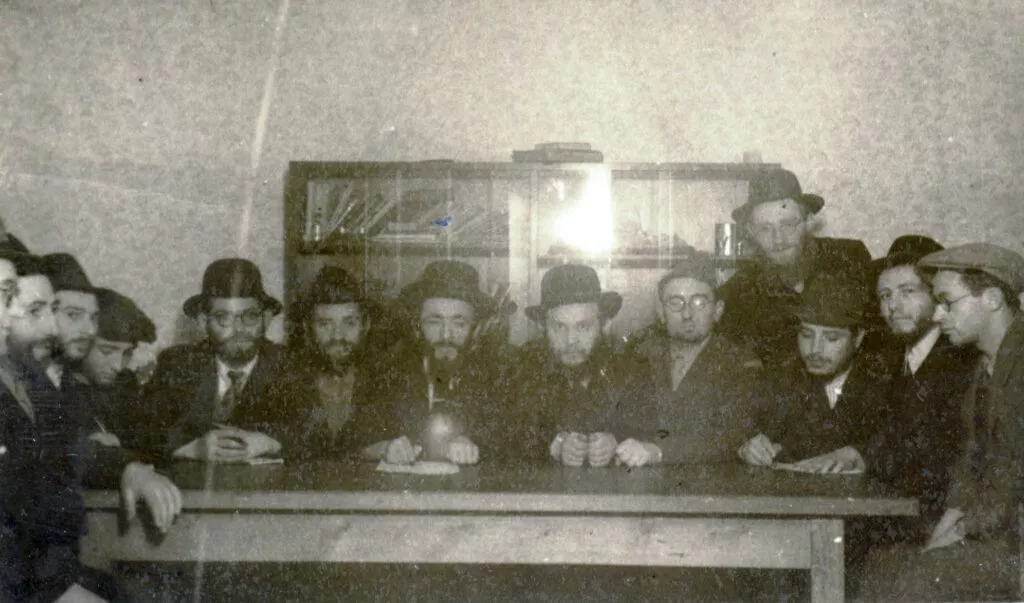The Girl Who Requested a Siddur (Prayerbook) in Auschwitz
Story written by Yaakov Rosenfeld, Ganzach Kiddush Hashem
Rabbi Aviezer Borstein, who was the son of the rabbi of the village of Goborowo, Poland, was a Torah scholar and prodigy, one of the foremost students of the Chachmei Lublin yeshiva, and who was ordained as his choice to the rabbinate, experienced the horrors of the Holocaust. His literary descriptions of his suffering in those days of darkness and death shake the heart and make their readers shudder.
Rabbi Aviezer was a gifted writer, and the fruits of his rich writing are enjoyed by historians and seekers of knowledge to this day. The books he wrote about the great men of previous generations are unique and rare documentation material, that provide valuable information about people and places, and without these books, no one could have researched or written about these topics. However, his writing about his experiences during the evil days is completely different. It provides a terrible and unbearably difficult testimony about what happened there, and the things that are indeed difficult to read, deserve to be seen by the younger generation who may not understand enough what exactly happened then, in the years of rage and tragedy.

Rabbi Aviezer Borstein with rabbis in the Bergen-Belsen DP camp
In the Zachor booklet (vol. 3, Elul 5649/Summer 1983) edited by Rabbi Aviezer, he tells about his experiences in Auschwitz, and the horrific description of the torture he and his friends went through in the “Sewage Brigade” (Sheis Commando), whose job it was to clean the cesspools of the camps and crematoria, which we will leave to the reader’s imagination (even though the reality there was horrible and sickening beyond imagination). But among his words he describes his meeting with a Jewish girl who was heartbroken and worried, about whom we will now tell.
We, the group of sewer workers, told Rabbi Burstein, saw with our own eyes the poverty and suffering of all the camp inmates, but worst of all was the suffering of the Jewish women in the Birkenau B camp.
These poor women were trampled by the rough feet of SS women, who humiliated them in a terrible way. They were brutally tortured by the Nazi overseers, who also did not give them proper clothes to wear.
They gave short girls wide and big dresses, while tall women – short and narrow dresses, and this was merely to humiliate them, to abuse the “daughters of Israel.”
In spite of our sad condition, the rabbi continued and described, our hearts were torn with pain when we saw our unfortunate sisters in their wretched and low state. We tried as much as we could to be of help to them, to encourage them and to ease their suffering. We even managed to set up a kind of “aid factory” for them, and so, every time we were, as part of our “work”, in the “Efekten Lager” (sorting camp) we hid items of clothing such as sweaters and woolen socks in our work tools, and gave them to the unfortunate women.
Not all women dared to approach us to ask for help. Many of them were ashamed to show their faces to us in their wretched condition, and preferred to freeze to death and die of hunger rather than to need the help of men, even brothers sharing their pain.
There were also those who did not want to approach us because of the rough and dirty speech of Isaac, the kapo, who was already spoiled before the war and the circumstances further degraded him into the realms of ugliness and filth. Kosher Jewish women preferred to endure cold and the shame of hunger than to hear the comments of the dubious man.
Rabbi Borstein continued and told: One day, while we were in Camp B, a girl approached us, with failing and hesitant steps. It was obvious that she wanted something and was afraid to ask. And the girl, about fifteen years old I guess, with black and deep Jewish eyes hollowed in from her narrow face, she was ashen and thin as a stick, literally skin and bones, and like that, delicate and frail she stood in front of us, abysses of sadness emanated from the eyes of this tormented and broken daughter of Israel, it was obvious that she grew up in a chassidic home.
Baruch asled her: How can I help you? What are you lacking? Perhaps I have it…
The young girl lowered her eyes and whispered:
Sweater.
It pained me greatly that that exactly on that day I did not have a sweater on me to give her and I promised her that the next day, when I returned there from the “Efekten Lager,” I would not forget to bring her what she requested.
The next day I indeed searched and in the end I found a soft and fine woolen sweater, and when we passed Birkenau B I noticed a girl standing in the doorway of a shack waiting for me.
She waited for Isaac to move away from the cart and then approached me and I, feeling satisfied that I was able to give help even a little bit to an unhappy and lonely Jewish girl, gave her the sweater.
But she, as if stuck, nailed in place, stood motionless and did not reach out to take the sweater.
She told me: No, I didn’t ask for a sweater. I asked for a siddur (prayerbook).
I would like a siddur to daven from.
Then it became clear to me that I had not heard the quiet speech of this noble girl well. The word “siddur” in the chasidic pronounciation sounded like the word “sweater” to me. I thought she was longing for warm clothing to protect her thin and shrunken body, and really she just wanted a siddur. She wanted an siddur to pray, to talk to God. To pour out the bitterness of her soul before God.







